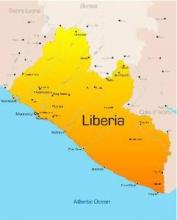Liberian health officials have stepped up their ability to respond to the ongoing Ebola epidemic, improving facilities and boosting personnel to help meet the crisis.
In response to last spring’s increasing cases in more populous areas of the country, officials undertook a facilities and personnel assessment in four rural counties in the southeast. Conducted in August, the review found serious problems with the ability to effectively respond to any developing Ebola threat, Dr. Joseph Forrester and his colleagues wrote in the Oct. 7 issue of the Morbidity and Mortality Weekly Report (2014;63:1-3).
Each of the four reviewed counties contained one referral hospital; the region had previously been served by six physicians, but three of these had fled the county because of the epidemic, said Dr. Forrester, an infectious disease specialist with the Centers for Disease Control and Prevention.
In two hospitals, nursing staff had ceased coming to work; in another, workers were still providing care despite not having been paid for 3 months. Nursing students, aides, and community volunteers were providing much of basic medical care, and even responding to obstetric and surgical emergencies.
Even the most basic supplies were depleted or absent. There were few hand-washing stations, and most of these consisted of a simple water jug. Soap, bleach, and alcohol hand gels were rare. There were only rudimentary isolation facilities in two counties, and neither of these had water, electricity, or waste disposal. Communication between the hospitals and county health officials was via cell phone or radio, with little Internet connectivity. About half of the local health care facilities had no communications at all and required site visits for assessment. Only one ambulance served the entire four-county region. There was little or no protective equipment for those who would work with patients.
Although each county had an Ebola task force, problems with transportation, communication, and resources limited their effectiveness. Health care workers had not received proper training for Ebola patient care or case investigation, including how to trace patient contacts.
Since the assessment, however, things have improved, Dr. Forrester and his coauthors wrote. Health officials in one county were able to identify their first patient – a woman who died during a spontaneous abortion on Aug. 3. She had apparently been infected in Monrovia after attending a funeral. Shortly thereafter, patient 2 was diagnosed – a man who had participated in the community funeral of patient 1 and who was attempting to flee to another Liberian county. “He was sent back ... and later reported to have died of laboratory-confirmed Ebola. This was the first evidence of secondary transmission of Ebola in southeast Liberia,” the team noted.
Since August, additional cases have surfaced in southeast Liberia, but the region is better prepared to cope with them. Local health officials have been trained in surveillance, infection control and prevention, and safe burial practices. There are regular, coordinated task force meetings. Additional ambulances are available; there are plans to establish three specialized treatment centers.
“Still,” the researchers wrote, “obstacles to prevent the spread of Ebola remain, and personal protective equipment, sufficient personnel for effective contact tracing and case management, efficient patient transport, and regional diagnostic laboratory capabilities are urgently needed.”
The latest updates, including case counts, on the 2014 Ebola outbreak in West Africa are available at http://www.cdc.gov/vhf/Ebola/outbreaks/guinea/index.html. The most up-to-date clinical guidelines on the 2014 Ebola outbreak in West Africa are available at http://www.cdc.gov/vhf/ebola/hcp/index.html.
On Twitter @alz_gal



